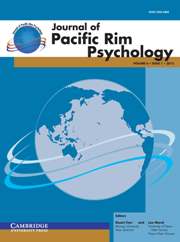Crossref Citations
This article has been cited by the following publications. This list is generated based on data provided by
Crossref.
Beauregard, Caroline
2014.
Effects of classroom-based creative expression programmes on children's well-being.
The Arts in Psychotherapy,
Vol. 41,
Issue. 3,
p.
269.
Hetrick, Sarah E
Cox, Georgina R
Witt, Katrina G
Bir, Julliet J
and
Merry, Sally N
2016.
Cognitive behavioural therapy (CBT), third-wave CBT and interpersonal therapy (IPT) based interventions for preventing depression in children and adolescents.
Cochrane Database of Systematic Reviews,
Vol. 2016,
Issue. 8,
Werner-Seidler, Aliza
Perry, Yael
Calear, Alison L.
Newby, Jill M.
and
Christensen, Helen
2017.
School-based depression and anxiety prevention programs for young people: A systematic review and meta-analysis.
Clinical Psychology Review,
Vol. 51,
Issue. ,
p.
30.
Pollok, Justyna
Van agteren, Joseph
Chong, Alwin
Carson‐chahhoud, Kristin
and
Smith, Brian
2018.
Evaluation of existing experimental evidence for treatment of depression in indigenous populations: A systematic review.
Australian Journal of Psychology,
Vol. 70,
Issue. 4,
p.
305.
Calear, Alison L.
Werner-Seidler, Aliza
Torok, Michelle
and
Christensen, Helen
2018.
Handbook of School-Based Mental Health Promotion.
p.
279.
Ssegonja, Richard
Nystrand, Camilla
Feldman, Inna
Sarkadi, Anna
Langenskiöld, Sophie
and
Jonsson, Ulf
2019.
Indicated preventive interventions for depression in children and adolescents: A meta-analysis and meta-regression.
Preventive Medicine,
Vol. 118,
Issue. ,
p.
7.
D'Amico, Elizabeth J.
Dickerson, Daniel L.
Brown, Ryan A.
Johnson, Carrie L.
Klein, David J.
and
Agniel, Denis
2020.
Motivational interviewing and culture for urban Native American youth (MICUNAY): A randomized controlled trial.
Journal of Substance Abuse Treatment,
Vol. 111,
Issue. ,
p.
86.
Jongen, Crystal Sky
McCalman, Janya
and
Bainbridge, Roxanne Gwendolyn
2020.
A Systematic Scoping Review of the Resilience Intervention Literature for Indigenous Adolescents in CANZUS Nations.
Frontiers in Public Health,
Vol. 7,
Issue. ,
Gee, Brioney
Reynolds, Shirley
Carroll, Ben
Orchard, Faith
Clarke, Tim
Martin, David
Wilson, Jon
and
Pass, Laura
2020.
Practitioner Review: Effectiveness of indicated school‐based interventions for adolescent depression and anxiety – a meta‐analytic review.
Journal of Child Psychology and Psychiatry,
Vol. 61,
Issue. 7,
p.
739.
Gee, Brioney
Wilson, Jon
Clarke, Tim
Farthing, Sophie
Carroll, Ben
Jackson, Christopher
King, Kahfee
Murdoch, Jamie
Fonagy, Peter
and
Notley, Caitlin
2021.
Review: Delivering mental health support within schools and colleges – a thematic synthesis of barriers and facilitators to implementation of indicated psychological interventions for adolescents.
Child and Adolescent Mental Health,
Vol. 26,
Issue. 1,
p.
34.
Werner-Seidler, Aliza
Spanos, Samantha
Calear, Alison L.
Perry, Yael
Torok, Michelle
O'Dea, Bridianne
Christensen, Helen
and
Newby, Jill M.
2021.
School-based depression and anxiety prevention programs: An updated systematic review and meta-analysis.
Clinical Psychology Review,
Vol. 89,
Issue. ,
p.
102079.
Caldwell, Deborah M
Davies, Sarah R
Thorn, Joanna C
Palmer, Jennifer C
Caro, Paola
Hetrick, Sarah E
Gunnell, David
Anwer, Sumayya
López-López, José A
French, Clare
Kidger, Judi
Dawson, Sarah
Churchill, Rachel
Thomas, James
Campbell, Rona
and
Welton, Nicky J
2021.
School-based interventions to prevent anxiety, depression and conduct disorder in children and young people: a systematic review and network meta-analysis.
Public Health Research,
Vol. 9,
Issue. 8,
p.
1.
Meinhardt, Inge
Cargo, Tania
Te Maro, Ben
Bowden, Linda
Fortune, Sarah
Cuthbert, Sasha
James, Susanna
Cook, Riley
Papalii, Tania
Kapa-Kingi, Korotangi
Kapa-Kingi, Mariameno
Prescott, Annabelle
and
Hetrick, Sarah Elisabeth
2022.
Development of guidelines for school staff on supporting students who self-harm: a Delphi study.
BMC Psychiatry,
Vol. 22,
Issue. 1,
Wilson, Jon
Gee, Brioney
Martin, Nicola
Maxwell, Sarah
Murdoch, Jamie
Clarke, Tim
Clark, Allan
Turner, David
Notley, Caitlin
Katangwe, Thando
Jones, Peter B
and
Fonagy, Peter
2022.
Brief education supported psychological treatment for adolescent borderline personality disorder: the BEST feasibility RCT.
Health and Social Care Delivery Research,
Vol. 10,
Issue. 37,
p.
1.
Duagi, Denis
Carter, Ben
Farrelly, Maria
Lisk, Stephen
Shearer, James
Byford, Sarah
James, Kirsty
and
Brown, June S.L.
2024.
Long-term effects of psychosocial interventions for adolescents on depression and anxiety: a systematic review and meta-analysis.
eClinicalMedicine,
Vol. 68,
Issue. ,
p.
102382.
Bjornstad, Gretchen
Sonthalia, Shreya
Rouse, Benjamin
Freeman, Leanne
Hessami, Natasha
Dunne, Jo Hickman
and
Axford, Nick
2024.
A comparison of the effectiveness of cognitive behavioural interventions based on delivery features for elevated symptoms of depression in adolescents: A systematic review.
Campbell Systematic Reviews,
Vol. 20,
Issue. 1,
Du Toit, Stefani
Tomlinson, Mark
Laurenzi, Christina A.
Gordon, Sarah
Hartmann, Laura
Abrahams, Nina
Bradshaw, Melissa
Brand, Amanda
Melendez-Torres, G.J.
Servili, Chiara
Dua, Tarun
Ross, David A.
Lai, Joanna
and
Skeen, Sarah
2025.
Psychosocial Interventions for Preventing Mental Health Conditions in Adolescents With Emotional Problems: A Meta-Analysis.
Journal of Adolescent Health,
Vol. 76,
Issue. 2,
p.
187.


